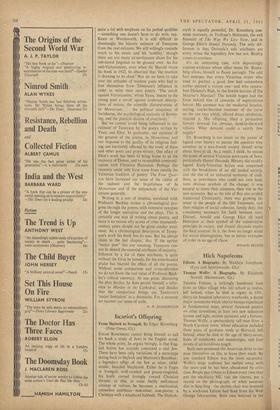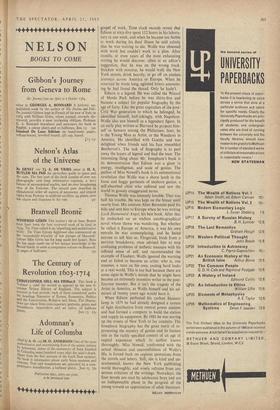Hick Napoleons
Edison: A Biography. By Matthew Josephson. (Eyre and Spottiswoode, 42s.) Thomas Wolfe: A Biography. By Elizabeth Nowell. (Heinemann, 42s.) THOMAS EntsoN. a strikingly handsome man from an Ohio village who left school at twelve, left behind, when he died at eighty in 1931, thirty-six hundred laboratory notebooks, a dozen major inventions which altered human experience in fundamental ways, several thousand patents on other inventions, at least two new industries (power and light, motion pictures), and a fortune, Thomas' Wolfe, a spectacularly tall man from a North Carolina town, whose education included three years of graduate study at Harvard, left behind, when he died at the age of thirty-seven, bales of notebooks and manuscripts, and four novels of an inordinate length.
Both men possessed the American drive to im- pose themselves on life, to leave their mark. By any standard Edison was the more successful. Wolfe's large audience has melted away with the years and he has been abandoned by criti- cism. People pay tribute to Edison every time they pay the electricity bill, visit the cinema, put a record on the phonograph, or when someone dies in Sing-Sing- the electric chair was invented by a workman Edison had fired from his West Orange laboratories. Both men believed in the
gospel of work. Time clock records reveal that Edison at sixty-five spent 112 hours in his labora-• tory in one week, and when he became too feeble to work during his final illness he said calmly that he was waiting to die. Wolfe was obsessed with work but couldn't work to a plan. After months or even years of the most exhausting writing he would discover, often at an editor's suggestion, that he was on the wrong track. Stricken with remorse, he would walk the New York streets, drink heavily, or go off on aimless journeys across America or Europe. When he returned he wrote long, agitated letters announc- ing he had found the thread. Only he hadn't. Edison is a legend. He was called the Wizard of Menlo Park before he was thirty-five and became a subject for popular biography by the age of forty. Like the great capitalists of the post- Civil War generation to which he belonged, he identified himself, half-jokingly, with Napoleon. Wolfe also saw himself as a legendary figure. In an early play written at Harvard he projects him- self as Samson among the Philistines; later, he i1/4 the Young Man as Artist, or the Wanderer in America. He identified with Goethe and was delighted when friends said his face resembled Beethoven's. The task of biography is to peel away the layers of legend and find the man. The interesting thing about Mr. Josephson's book is its demonstration that Edison was a giant in energy, intelligence, and scale of genius. The pathos of Miss Nowell's book is its unintentional revelation that Wolfe was a shorn lamb in the loose and baggy garments of unshorn genius, a self-absorbed child who suffered and saw the world in grossly exaggerated terms.
Thomas Wolfe was intensely lovable. That was half his trouble. He was kept on the breast until nearly four. His mistress Aline Bernstein paid his bills and sent him to Europe when he was writing Look Homeward Angel, his best book. After that he embarked on an endless autobiographical novel whose theme was wandering. But whether he called it Europe or America, it was his own entrails he was contemplating, and he hated anyone to tell him so. Fitzgerald, fresh from a nervous breakdown, once advised him to stop confusing problems of aesthetic measure with his inflated sense of self, and recommended the example of Flaubert. Wolfe ignored the warning and so failed to become an artist; who is, one assumes, a man on his own, casting hard looks at a real world. This is too bad because there are some signs in Wolfe's novels that he might have become an extremely inventive writer in the post- Joycean manner. But it isn't the tragedy of the Artist in America, as Wolfe himself and his ad- mirers of twenty years ago would have it.
When Edison perfected his carbon filament lamp in 1879 he had already designed a system of light distribution from central power stations and had formed a company to build the station and supply its equipment. By 1881 he was tearing up the streets of New York to lay conduits. The Josephson biography has the great merit of re- presenting the mystery of genius and its human side in the richly specified context of an age of capital expansion which its author knows thoroughly. Miss Nowell, confronted with the actual thinness and uneventfulness of Wolfe's life, is forced back on copious quotations from the novels and letters. Still, she is kind and un- sentimental, knows the New York publishing world thoroughly, and wisely refrains from any serious criticism of the writings. Nowadays, the four novels are read by adolescent boys and are an indispensable phase in the progres's of the young toward an appreciation of adult literature.
JULIAN MOYNAHAN















































 Previous page
Previous page